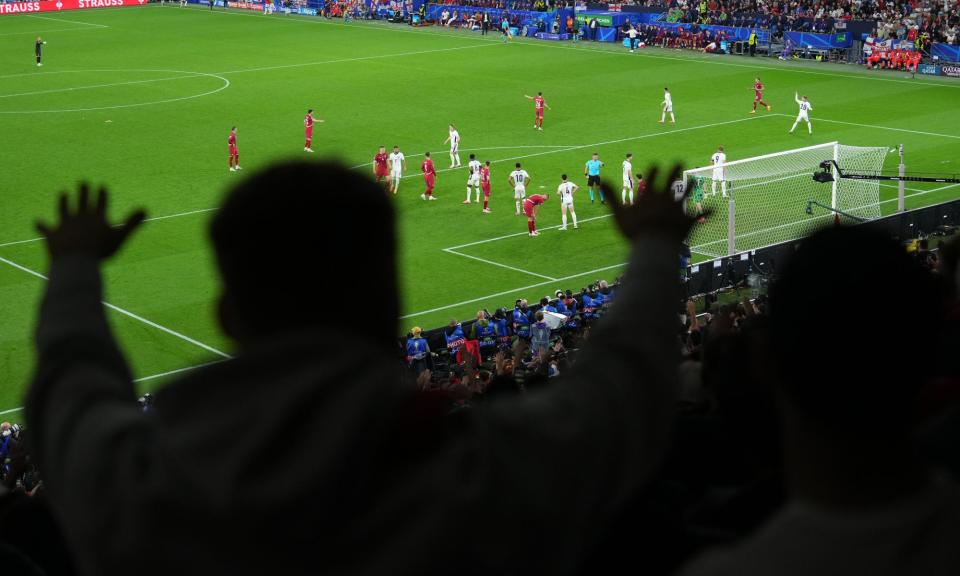Kosovan journalist barred from Euro 2024 after ‘eagle’ sign to Serbia fans

Uefa has barred a Kosovan journalist from the remainder of Euro 2024 after he aimed an Albanian “eagle” sign towards Serbia fans during a live broadcast at their match against England in Gelsenkirchen.
Arlind Sadiku, who reports for the television channel Artmotion, was refused entry to Albania’s press conference on Tuesday and subsequently had his accreditation confiscated. In a letter seen by the Guardian, Sadiku’s employers were told by Uefa that his pass had been cancelled with immediate effect due to “misconduct at the match between Serbia and England”.
Related: Uefa investigating alleged racist chanting by Serbia fans in England game
Before the match on Sunday, Sadiku had been reporting from what he says was a Uefa-allocated position in front of several thousand Serbia supporters. Chants are audible and Sadiku says they included the phrase “Kosovo je srce Srbije” (“Kosovo is the heart of Serbia”). Towards the end of the three-minute segment he looked towards the crowd and made the “eagle” gesture with his hands.
Serbia does not recognise Kosovo’s independence and relations have continued to be tense since the brutal Kosovo war ended in 1999. Ethnic Albanians form nearly 93% of Kosovo’s population and the countries share a tight bond. The “eagle” symbol, which represents the double-headed eagle on Albania’s flag and is also the Albanian football association’s official motif for Euro 2024, is likely to have been viewed as incendiary given a long history of enmity with Serbia that has frequently reared its head in football.
Sadiku, who has received death threats via social media in the intervening three days, told the Guardian that his reaction was instinctive and emotional. “People don’t know how I was feeling in that moment because I have trauma from the war,” he said. “My house was bombed in the middle of the night when I was a child, I was sleeping and remember waking up with glass and blood all over my face and body. I know it was unprofessional from a journalist’s perspective, but seeing my family in that situation was traumatic for me and I can’t forget it.”
The “eagle” salute caused controversy at the 2018 World Cup after being deployed by the Switzerland players Xherdan Shaqiri and Granit Xhaka, who were both born to parents of Kosovan heritage, in a match against Serbia. Both players were fined.
In response to an enquiry from the Guardian, a Uefa statement read: “Uefa can confirm that one journalist has had his accreditation cancelled due to misconduct at the Uefa Euro 2024 match between Serbia and England on 16 June 2024. This reporter can be replaced by another journalist from the same organisation for the remainder of the tournament.”
Uefa has been kept busy by both Serbian and Albanian fans in the first week of Euro 2024. Serbia have been fined €10,000 (£8,500) after fans displayed a banner that “transmitted a provocative message unfit for a sports event” and €4,500 for throwing objects inside the stadium during the England game. Uefa’s action followed a complaint by Kosovo’s football association regarding “Serbian fans displaying political, chauvinistic, and racist messages against Kosovo”.
Meanwhile, Albania have been fined €37,375 after incidents in their opening match against Italy on Saturday, including “transmitting a provocative message unfit for a sports event”. Further action may be considered after reports on Wednesday afternoon suggested Albanian and Croatian fans had engaged in anti-Serbia chants during their match in Hamburg.

